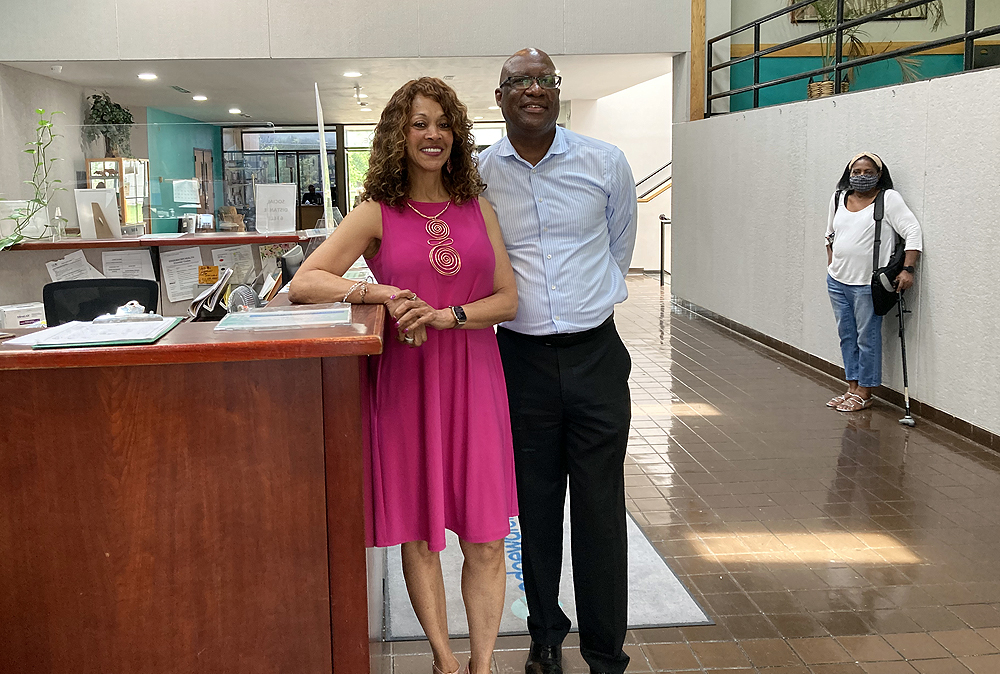
Edgewater CEO Danita Hughes and Chief Clinical Officer Chris Carroll
Gary on path to a mobile mental health crisis response program
Contributed By: The 411 News
Edgewater Health preparing a pilot program to help people instead of calling the police
Listening to its residents, Gary's city council has designated $1.5 million of American Rescue Plan Act (ARPA) funds for an initiative to improve access to mental health services.
If approved by the council and mayor, Ordinance C.P.O. 2022-54 will create and support a mental health crisis response program with mobile teams to answer calls for help instead of relying on the police.
'Help Not Handcuffs' is the hope for a cluster of Gary churches that formed the Interfaith Action Network, then set about working with the city council and Edgewater Health to develop a pilot program to serve people in crisis. Their hope is that the homeless, those facing incidences of mental illness, or substance abuse won’t face criminal charges or jail time.
Chris Carroll, Chief Clinical Officer at Edgewater sees Gary's program as a 24/7, 365-day, 'no decline' operation that will respond to individuals and families experiencing disruptions in their lives, whether mental or behavioral.
No decline means everyone who comes through their doors will be served or a team will be dispatched to meet people where they are. "No matter how many times they call," Carroll said.
The mobile crisis response units will be standalone, clinicians’ only teams; not co-responder teams that have a social worker and a police officer working together.
"We don't want to put the police in a bad situation, having an officer go out and try to handle something that is more mental health. Trained mental health workers know before they get on the scene, whether police are needed," Carroll explained. "We want to build a model in Gary where people will call a crisis response number that the community and police have been trained to use, just like we've been trained since we were children to call 911."
"We would respond first. In my experiences as a crisis worker, the majority of mental health crises didn't require law enforcement," Carroll said. "A lot of schools call when they have issues with kids at school. They have to call the police even though it may not be a police matter. That's because they don't have an option."
What the program will do is give schools and the community options.
"We are going to partner with the police, work with them, because there will be times when crisis response needs the police for safety," Carroll said.
When the call comes in, some assessment will be done over the phone. If the call is suicidal, the crisis worker will ask if weapons are in the home. If there are weapons, police will be needed. If not, the crisis worker will go out and assess the situation to determine the best course of action
The other part of crisis response is linking those who needed help to treatment and services that same day or the next day. "The police aren't charged to address that. We are charged to address it," Carroll said.
After a period of educating the community and relationship building with other agencies and organizations, crisis response units will benefit the city in many ways, he said. Law enforcement, the schools, the community will know what is a crisis. "Right now there is in the region a resurgence in crisis intervention training for the police that Edgewater is part of."
Carroll said, "The biggest thing that people need to know is 'what to do when they see or suspect something'. We want you to pick up the phone and let us figure that out for you. That's a weight off of people."
The program can save money by keeping people out of psychiatric hospitals, keeping people out of jail so they don't have to go to jail to get mental health treatment, and keeping them out of the emergency rooms.
Story Posted:07/27/2022
|